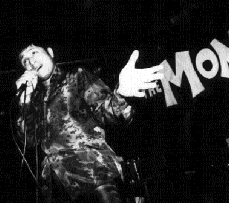

24/6/01
12:12 pm GMT

alt.culture.lm
alt.culture.musicAsian fusion or confusion?Is Asian Fusion the new musical explosion or the latest over-hyped media darling? Andrew Calcutt investigatesOnly two years old and already it's had a whole family of names: New Asian Cool, Asian Underground, Asian Fusion, Eurasian Sound, Asian Nu Skool and Future Asian Beatz. But beneath the various labels the idea is the same: take dance rhythms and lay some Indian influences (classical, film music, Bhangra) on top.In musical terms, the results were at first clumsy if interesting, but soon developed into something more sophisticated and arresting. As a media phenomenon, it caught on with the music press and the trendiest London clubbers, who made Talvin Singh's Anokha and Nithin Sawhney's Outcaste the hottest nights in town. Singh has even won a South Bank Show award; but the disappointing sales of his solo album (heavily promoted and recorded in London, New York and Okinawa) suggest that Asian Fusion has not yet come together with the mass market. The fragmentation of the Asian music scene may help to explain this failure. At the premiere of Zindagi, a new club night in Camden, Tarsame Jamail of Sub Dub Records (aka Taz of Swami, aka Johnny Zee of Stereo Nation) talked about closing the gap between the Bhangra-based Brasians (British Asians) in the North and the post-rave, 'I-never-listen-to-Bhangra' London scene. Pervaiz Khan, who provides digital images for Zindagi, explained that there are musical differences even among Brasians with a preference for Western music: in London, he said, they lean towards drum'n'bass and a style of music-making that relies on mixing and sampling, whereas in Birmingham they are rooted in soul and reggae, and they tend to write songs instead of producing tracks. Jamail's colleague Diamond Duggal introduced yet another distinction, complaining that the press had concentrated on the music of 'Bengali kids' from east London: 'Fair play to them, but most Asians in Britain are Punjabi and they want something they can relate to.' Then there are further differences between Brasians and their counterparts in the Indian subcontinent. Whereas the latter are relatively unconcerned about their identity and do not need confirmation of it from, say, snatches of Indian classical music, the former are much more hung up about who they are, apparently hungry for as many reminders as the dj can introduce into the groove. Diamond Duggal believes that 'we don't live on this island, we're global', but there are different, local demands on his music being made by people of Asian descent from around the world. For many djs the solution to this fragmented identity is to 'go with the flow' of the crowd they are playing to, mixing and matching according to their demands. Nearly everybody talks about breaking down barriers and bringing different groups together. But among Brasians the frequent references to 'fusion' really seem to indicate that nobody knows for sure what they want to be. Fusion is a euphemism for confusion, and while there is no single sound or concept that is strong enough to override local differences and get everybody behind it, doubt must remain as to whether Asian music will really make it as the next big thing. The fact that today's young British Asians are concerned with questions of identity does at least suggest that, unlike previous generations, they are blurring the stereotypical roles traditionally allotted to Indians and Pakistanis by the spirit of the Empire, from shopkeepers and junior civil servants to victims of racist attacks. For many Brasians, this is a period of greater social mobility which allows them to put some distance between themselves and the uncool image of Asians. Only a few years ago, Asians were considered so unfashionable that Apache Indian had to be marketed as quasi-Afro-Caribbean. Although there are still plenty of young Asians who pretend to be American blacks ('wiggas', as Pervaiz Khan describes them), being ostentatiously Asian is increasingly acceptable - especially at a time when Janet Jackson and Demi Moore wear bindis, and the artist formerly known as Prince and Madonna have been painted with mehndi henna dye patterns. If there is more space today for Brasians to express themselves, there is also greater scope for talking at cross purposes. Brasians want to be identifiably Asian, but they do not want to be confined to the cultural ghetto called 'exotic' - hence their ambition to be global as well as local. But for young whites in search of the latest ethnicity, the exotic aspect of Asian music - as they see it - is one of the main reasons for buying into it. The relationship is not as black and white as it used to be, in the days when 'white Negroes' bought music made by blacks to express their alienation from their parents' society. In Britain today the dividing lines between white and non-white are not so sharp; which means that there are fewer prohibitions on the spread of Asian music. But on the other hand it does not have the illicit character traditionally associated with black music from blues to rap - in which case there is no urgent reason for it to catch on among whites who want a taste of danger. Today, brown cannot be the new black. At a time when nobody is sure of their identity - not even the British establishment - neither black nor brown nor white are the colours they once were.
Zindagi (Hindi for 'life') is at The Monarch, Chalk Farm Road, London NW1 on the last Thursday of each month.
Talvin Singh, tabla player, producer, founder of Anokha: 'Exoticism exists everywhere. In Bombay an electric guitar is exotic. Over here they think a sitar is exotic.' Kam, tabla player with Swami: 'Anyone from the Asian progressive scene who doesn't see the importance of Bhangra is a fool...Some of my biggest influences are Depeche Mode, Michael Jackson and Quincy Jones.' Diamond Duggal, Sub Dub Records: 'In a club in Bombay you can play anything because whatever you play you're still an Indian in India. Whereas in Britain there is more concern about being a British Asian. In the clubs in India they don't want to hear Indian classical music. I mean, how long can you listen to that before you want to hear someone singing?' Badmarsh, dj with Outcaste: 'When I began making my own dance music it always got a good reaction, but I felt there was something missing, something saying "that's not me". One day I was at home and my parents were listening to Hindi film music, and it clicked: try sounds from your own culture.' Ny, rapper with Charged: 'We're walking the cracks. Culture is paving slabs - we walk the cracks between. We're part of the Asian Underground but we've got loads of influences. My folks came here from the West Indies, so I grew up listening to Calypso and all sorts alongside Indian music. We want to take all those sounds and mash it up.' Ny (Charged)
Taz (Swami and Stereo Nation)
Enza, dancer Signs of the times'The university is exhibiting a gross lack of moral leadership - it is supposed to be presenting itself as some kind of Club 18-30 holiday'David Robinson, professor at Liverpool John Moores University. The college's new prospectus encourages students to come to Liverpool for a good piss-up
'It makes you wonder what a 29-year old player at Rochdale, who has a mortgage and three kids to feed and only three months left on his contract, thinks about it all'
'Tim Henman's a nice guy and a very good player, but he has that comfortable middle class look about him. The English middle class basically don't have the stomach for a fight'
'Should you decide that your children must not hear this record, we would be grateful for your wisdom and good sense and will put our fingers in our ears whenever we hear it played. If on the other hand, you feel that no harm will come to your children by being exposed to this song, give the guidance so sorely needed and tell them it's OK to do so'
'This is evolution. They will offer safety, security, and look after the new female members' 'I lived at Eton in the 1950s and know all about life in uncomfortable quarters'Jonathan Aitken contemplates life at Her Majesty's pleasure
'At this moment in time I did not say them things' Reproduced from LM issue 118, March 1999 |
|
http://www.informinc.co.uk/LM/LM118/LM118_Alt.cult.html |
Mail: webmaster@mail.informinc.co.uk

